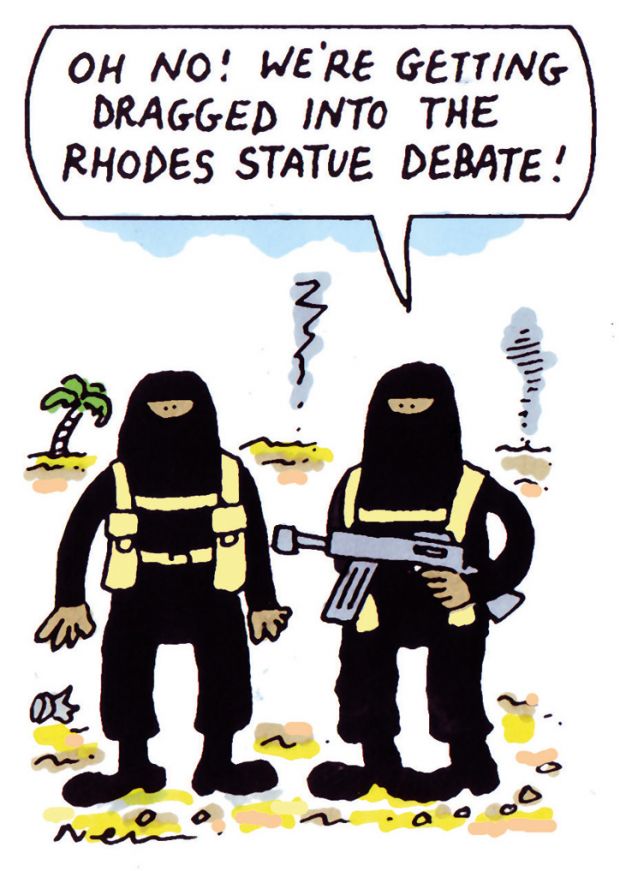
There is no end in sight to the controversy over the statue of imperialist Cecil Rhodes that gazes down from Oriel College, Oxford – indeed, letter writers to national newspapers in recent weeks seem to have discussed little else. The ante was most definitely upped by a Sunday Times interview on 27 December with Ntokozo Qwabe, the South African co-founder of the group Rhodes Must Fall Oxford, which is campaigning to have the statue removed, in which he called the French tricolour a “violent symbol” comparable to the Nazi swastika because of French bombing in the Middle East and said that he would support a campaign to remove the flag from campuses. Mr Qwabe, a Rhodes scholar at the university, also described Oxford as “fundamentally racist” and said that he had left his first college after a fellow student had accused him of stealing milk – a charge he took to be racially motivated.
The letter writers’ backlash was swift. “A selection process that allows someone with such extreme views to become a Rhodes scholar is surely in urgent need of revision,” wrote Michael Patterson to The Times two days later. Meanwhile, in what might be thought of as an updated version of Godwin’s Law (the rule that says online debate inevitably descends into Nazi analogies), a number of critics likened the Rhodes campaign to Islamic State, because both have taken a dislike to certain statues. Both groups “don’t feel comfortable walking past statues that celebrate values different to their own”, wrote Frank Furedi, emeritus professor of sociology at the University of Kent, in The Sun. If IS can restrict its activities to petitions against Oxford-based monuments, then this year might be an improvement on 2015.
After securing the president’s job at New York University, Andrew Hamilton must have been looking forward to a fresh start with no endless press stories about his salary (£462,000 total package in 2014-15, if you’re interested). So it must have been a refreshing change to see The New York Times write a story not about his salary but about what it called the “lavish perks” he will enjoy thanks to a refit of the president’s Greenwich Village apartment at a reported cost of “at least $1.1 million [£744,332], possibly double”. NYU has been “completely renovating a 4,200-square-foot penthouse duplex with four bedrooms, four and a half bathrooms and an expansive rooftop terrace”, the newspaper reported on 21 December. An NYU spokesman said: “This project has nothing to do with any one president; it is a renovation for the long term to turn what has been an event space for 15 years into a space that can both house NYU’s future presidents and host fund-raising events, visiting VIPs, etc.”
Downing Street records of a seminar to discuss education, hosted by then prime minister Margaret Thatcher in October 1985, were released on 30 December, as Times Higher Education reported. They detail how Lord Beloff, who had previously served as vice-chancellor of the private University of Buckingham, urged Baroness Thatcher to consider “an experiment in the privatisation of two or three [publicly funded] universities”. “The annual grant to those universities should be compounded as a capital sum and then the universities should be left to sink or swim,” recalls the note of the discussion, released by the National Archives. The document says that Lord Beloff won support for his proposal from several attendees at the event, who argued that it would “prompt greater competition between universities” and “make education more demand-led”. The ideas about competition are in the Green Paper – will those on “privatisation” be among the 1980s fads to make a comeback?
“Almost 50,000 students at British universities have been caught cheating in the past three years amid fears of a plagiarism ‘epidemic’ fuelled disproportionately by foreign students,” The Times reported on 2 January. “Students from outside the EU were more than four times as likely to cheat in exams and coursework, according to an investigation into academic misconduct based on more than 100 freedom of information requests,” it added. But the newspaper found that only “362 students were kicked out for cheating across Britain”. As with diving in football, there is only one place where honest Brits can pin the blame for this scourge: abroad. A Times leader said that in countries such as China and India “the culture of cheating has become so embedded that it often attracts barely any moral censure”, adding that allowing “explanation” or “leeway” for this “threatens to infect home students at British universities with the same moral blindness that is so pervasive abroad”.
Register to continue
Why register?
- Registration is free and only takes a moment
- Once registered, you can read 3 articles a month
- Sign up for our newsletter
Subscribe
Or subscribe for unlimited access to:
- Unlimited access to news, views, insights & reviews
- Digital editions
- Digital access to THE’s university and college rankings analysis
Already registered or a current subscriber?



